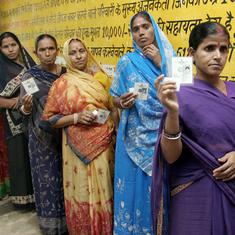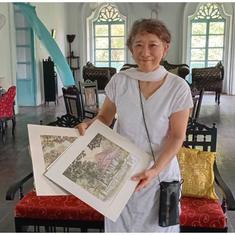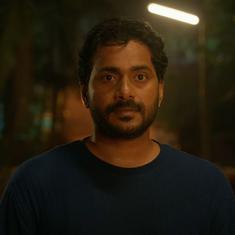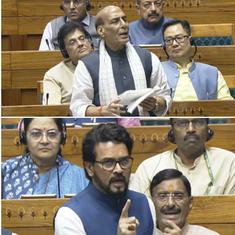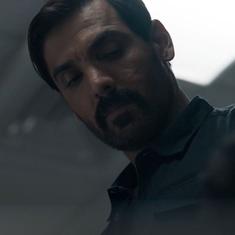This article has been written by award-winning actor Swara Bhasker.
All women growing up in India, South Asia, or anywhere in the world frankly; will remember in some form or the other that gentle girlhood admonishing, “Nice girls don’t do that.” I kept recalling that gently reasoned reproach as I watched Sharp Objects (you can catch it on Hotstar Premium). Adapted from the author of Gone Girl, Gillian Flynn’s debut novel Sharp Objects has been directed by Jean-Marc Vallée, who has my heart since he gave us Big Little Lies. It stars the multiple-Oscar nominee Amy Adams, who delivers a searing performance as Camille Preaker; and Patricia Clarkson, who is magnetic as the dominating and dark Adora Crellin. As an actress myself, it felt great to watch a show driven by its female performers.
The series is woven around a troubled, alcohol-dependent, self-harming, female journalist Camille (single and in her thirties incidentally) who returns to the small town of her birth and childhood, Wind Gap, Missouri, to report on two similarly gruesome murders of teenage girls. While the series is a murder mystery, it equally delves into the psychology, not just of the principal characters, but also of the town, and thus a culture as a whole.

There is a lot that impresses in Sharp Objects — the manner in which the storytelling gently unwraps a plot that is dark, disturbing and shocking, the stellar and crafty control that Jean-Marc Vallée exercises on his narrative, the cinematography that is fluid and still manages to suggest that something sinister lurks within Wind Gap, the editing which keeps this narrative languid yet sharp and consistently evokes a haunting sensation.
Sharp Objects is also liberating (apart from its positive performance on Bechdel parameters) as content — for female actors and for audiences in giving us female centric and female driven shows that do not bear the burden of providing either role-models or even uplifting messages.
Instead, it presents a world where women are dangerous and dysfunctional but very real — a world where women are neither pure victims, nor pure aggressors. A world where they occupy the grey areas, complex and contradictory as agents in a power play, in which they control some reigns too.
But to me personally, and perhaps to many young women viewers across the world, what makes Sharp Objects particularly impactful, perhaps almost poignant, is the manner in which it unravels the whole idea, the culture, the entire psychology of that childhood admonishment “Nice girls don’t do that.” Sharp Objects explores the sinister and dark possibilities of what the corollary of that thinking could be.
“Nice girls don’t do that.”
“Who does?”
“Bad girls.”
“So I’m a bad girl.”
“You shouldn’t be a bad girl.”
“Why not?”
“Bad girls get in trouble.”
“What trouble? What happens to bad girls?”
“Bad things.”
“What bad things?”
“Very bad things.”
“How bad?”
“Terrible!!!”
“Like what?”
“Like….”
A point the show makes early on is that both the victims of the introductory brutal murders were not your typically nice girly-girls. Camille, the traumatised protagonist carrying a burden from her past was herself not a nice girl. Amma, her deceptive half-sister manipulates the nice girl act to defy her controlling mother. But perhaps the most incisive critique on the whole ‘Be a nice girl’ culture, in fact the whole ‘nice’ culture — nice folks, nice manners, nice homes, nice towns — comes in the form of Adora’s character and the manner in which beneath the whole veneer of nice, a whole town is complicit in damning secrets and not-so-nice acts. At one point early on in the show, Adora tells her firstborn Camille, with whom she has a strained relationship (to put it mildly), “I just want things to be nice with us but maybe I don’t know how..” Interestingly it is this very notion of ‘nice’ that becomes the most oppressive and deceptive experience of young Camille, and later Amma’s growing years.
This ‘Culture of Nice’ is in fact the pervasive ‘Culture of Silence’ that women all over the world, particularly in India, are all too familiar with.
It takes different forms, but always towards the same goal — to silence the not-so-nice details of what the experiences; sometimes intimate experiences of women might be. This Culture of Silence is propagated from the child’s earliest experience of being parented by society in general. Amongst the values that girls receive in our early years — apart from those of being obedient, dutiful, respectful, homely — we also receive the twin headed Chimera in the form of shame and guilt.
“Have some shame!”
“Oh for shame!”
“Shameless!”
“Shameful!”
“Ashamed.”
“Do not bring shame upon…”
Different phrases in different languages, but always with the same implication. Shameful things happen to girls who are not nice and that brings ‘shame’ on the family or everyone associated with the girl. And nice folks do not talk about these things. Nice folks go on as if nothing has happened.
It is this culture of silence that women across the world today, are calling out in many different ways. Whether it is the #MeToo movement or a show like Sharp Objects; or on a lighter and happier note, even a film like Veere Di Wedding punctures this culture of silence, quite simply by refusing to be silenced and saying the not-nice things, or depicting the so called ‘unspeakable’ things that could happen to girls. By talking about the unspeakable, you rob it of the power to shame you; you disallow the ‘Culture of Nice’ to erase your experience. You stand up for yourself and you build your own identity.
And this to me is the most liberating aspect of being an actor, and even just a girl at a time when shows like Sharp Objects and Big Little Lies (another great show on Hotstar Premium), and films like Veere Di Wedding and Anaarkali Of Aarah are being made.
The next time I hear someone say, “Nice girls don’t do that!”, I know what I’m going to say — I don’t give a shit about nice. I’m just a girl! And that’s okay!

Swara is a an award winning actor of the Hindi film industry. Her last few films, including Veere Di Wedding, Anaarkali of Aaraah and Nil Battey Sannata have earned her both critical and commercial success. Swara is an occasional writer of articles and opinion pieces. The occasions are frequent :).
Watch the trailer of Sharp Objects here:
This article was published by the Scroll marketing team with Swara Bhasker on behalf of Hotstar Premium and not by the Scroll editorial team.

